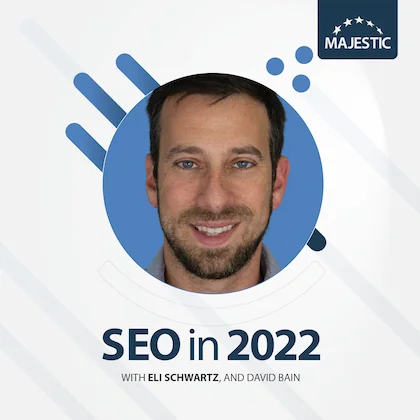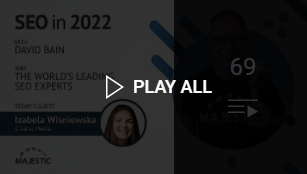-
Site Explorer
- Majestic
- Summary
- Ref Domains
- Backlinks
 New
New Lost
Lost- Context
- Anchor Text
- Pages
- Topics
- Link Graph
- Related Sites
- Advanced Tools
- Author ExplorerBeta
- Summary
- Similar Profiles
- Profile Backlinks
- Attributions
- Compare
-
Link Tools
- My Majestic
- Recent Activity
- Reports
- Campaigns
- Verified Domains
- OpenApps
- API Keys
- Keywords
- Keyword Generator
- Keyword Checker
- Search Explorer
- Link Tools
- Bulk Backlinks
- Neighbourhood Checker
- Submit URLs
- Experimental
- Index Merger
- Link Profile Fight
- Mutual Links
- Solo Links
- PDF Report
- Typo Domain
- Free SEO Tools
-
Support
- Blog

- Support
- Get started
- Tools
- Subscriptions & Billing
- FAQs
- Glossary
- How To Videos
- API Reference Guide

- Contact Us
- About Backlinks and SEO
- SEO in 2024
- Link Building Guides
- Webinars
- Blog
Stop focusing on keyword research
Eli Schwartz
Eli advises that you should stop spending quite so much time on keywords and start getting to know your actual users.

Stop focusing on keyword research
Eli says: "It's time for everyone in the SEO world to stop focusing on keyword research, keywords in general, and keyword research tools, and start thinking about the users and what they are looking for when they come to a search engine."
Is it not necessary to include keywords in web pages anymore?
"Keywords are absolutely necessary. However, if you think about the feedback loop that comes from keyword research tools, it cuts out the primary focus of the user. If you go to any keyword research tool and plug in the word, 'insurance', they spit back all these ideas around insurance. And it tells you to focus on them, leaving out the fact that insurance on the internet has been around for two decades, so you're unlikely to ever rank on those things.
It's not that keywords aren't necessary. The feedback you should be getting on which keywords to focus on should not be coming from keyword research - it should be coming from topical research from actual users, the founders of the company, or product managers. This will help you understand why they want this website to exist or why they believe search users should be finding this website. You need to discover what the user is going to be searching for because they have a problem that you're going to solve. This is better than the keyword research tool telling you what users search for."
Is there a danger in relying on product managers because their perception of the product is not necessarily aligned with target consumers' needs?
"That only applies to bad product managers. Every product manager should understand their customer and should build accordingly. The product manager is the CEO of a product. This means they're the ones that go to finance to get the money, go to designers to conceptualise how it should look, and go to engineers to get it built. They should understand the users. Now I'm not saying you must get the keywords from that product manager. I'm saying understand who they're building for - and personas are a huge part of this.
Think about SEO personas. Are users on mobile, and what kind of searches would they be doing? Maybe they're doing voice searches, which are really long-tail. Maybe they're doing image searches on their phones. Understand that user and understand how they're going to be searching to solve their problems, instead of going for the highest volume keywords and working your way down. Go for the highest interest and best match keywords. Some of these may not even have any search volume in the keyword research tools. That doesn't matter because you're really homing in on what the user wants, and what the user is going to be looking for."
If you're an SEO working in a smaller firm that doesn't have a product manager, what's the best way to reach out to the users?
"If you're in a smaller firm that doesn't have a product manager, you are the product manager - you own this thing. If you're writing content, you're conceptualising what this content should be because there's a user there. If you don't know there's a user there, take a pause. Maybe you shouldn't be building something if you don't know there's a user. Take a step back and find the user. The best way to understand what the user wants and what they are looking for, is to ask them.
Define an actual user. Use all the data you have within the organisation. This is your treasure trove of information. It could be from street interviews, customer calls, or emails. If you don't have the user to email, then that's not an SEO issue."
Do you target people who have expressed interest in your product or service - so they are just about ready to buy - but haven't purchased it yet?
"It's probably a big lift to have that conversation. I usually work with product managers or product leaders if it's an individual running their own company, as they have access to this kind of data. They understand how to talk to users. Looking for people who might be purchasing may be a little bit further away from their role, and it's certainly not something I'm going to do."
For research purposes, is 25 people an ideal number to aim for?
"Absolutely not. You can do two interviews and find anecdotal information that will provide lightbulb moments. Twenty-five people might just give you the same pattern over and over. It depends on the questions when you're doing a survey. If your questions are fairly tight, and you can get information from them, you don't need that many responses."
What's an example of a great question?
"It's going to be something quantitative, where you know that you fleshed out all the options. And when someone gives you an answer, you need to be confident they're giving you the answer to the question you asked. The question might be, 'Which is more important to you?' and the options could be 'brand', 'price', or 'shipping'. That's a very tight question, and there's no way to manoeuvre around it. If 75% of people say, 'price', you can be fairly confident that they're saying that because it is important to them.
If you ask another question, which isn't as tight, you might start having questions on your questions. If you're doing a small survey, and you have a tight question, and five people tell you 'price' - it's not statistically significant. But you might feel that you should elevate 'price' in your marketing efforts."
In conventional SEO, does that mean incorporating elements such as 'cheap' or 'good value' into your copy?
"Yes, and that's a great point when it comes to keywords. You might find the keyword 'cheap car insurance' from a keyword research tool but if you're marketing to more affluent customers, 'cheap car insurance' may make them feel like they're going to get conned. A more appropriate keyword might be 'value'. You have to talk to users and align your SEO with their preferences."
Can this kind of research be done online, or does it have to involve direct face-to-face or phone conversations with people?
"You don't have to do this over the phone or on Zoom, you could just send an email. It's an easy way to get information - you can welcome them and quickly ask, 'What was most important to you when deciding to purchase from us?' You'll suddenly find information that you would never have found had you not asked."
How can an SEO articulate the value of using a survey-based approach instead of a quantitative keyword-based approach to their boss?
"Why do bosses think that the quantitative keyword approach is any better? It's illogical to me. You need to use logic to convince them to try something else. We believe these are our customers, and we know that our customers are looking for this kind of thing. Allow me to try some content like this and see if it works."
Is this approach more appropriate for product pages and purchase funnels, or is it suitable for every type of content on your website?
"I always explain to clients that SEO is an investment. They're taking away money from other places to put that money into SEO. Therefore, they should be very certain the investment they're making has a customer behind it. If you're writing a blog post just for the sake of getting traffic, why make that investment?
This approach should matter - it's a customer-first approach. Is a search user going to discover this blog post and now have a higher opinion about our company or follow a purchase funnel? Or are they just going to read it? What's the point of having well-read blogs but no sales? I think this approach has worked for everything related to SEO."
What's one thing that an SEO needs to stop doing to focus more on customers and getting the information that's right for them?
"You need to understand the KPIs and metrics that the business is driving towards, which could be sales, dollars, or downloads. SEOs should stop focusing on keyword-level reporting - because it's the wrong metric. When you hand a list of chosen keywords and rankings to your boss or your client, you're judging success based on how you've done on these keywords. This can't be right because the rest of the business is measuring itself based on marketing costs versus revenue. All SEO is doing is measuring keyword performance – and the ones you've chosen might not even matter.
Stop doing the keyword-level reporting and start drilling into the actual attribution reporting. Then you will be far more successful."
You can find Eli Schwartz over at EliSchwartz.co.
Choose Your Own Learning Style
 Video
Video
If you like to get up-close with your favourite SEO experts, these one-to-one interviews might just be for you.
Watch all of our episodes, FREE, on our dedicated SEO in 2022 playlist.
 Podcast
Podcast
Maybe you are more of a listener than a watcher, or prefer to learn while you commute.
SEO in 2022 is available now via all the usual podcast platforms
Don't miss out
Opt-in to receive email updates.
It's the fastest way to find out more about SEO in 2025.
Could we improve this page for you? Please tell us





